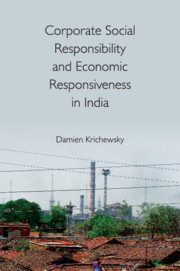Book contents
- Frontmatter
- Contents
- List of Tables and Maps
- List of Abbreviations
- Preface
- 1 Introduction
- 2 CSR, Functional Differentiation, and the Problem of Economic Responsiveness
- 3 Economic Differentiation and the Rise of India's ‘Embedded’ Corporate Capitalism
- 4 Increasing Functional Differentiation and the Rise of CSR
- 5 CSR at Work: Economic Responsiveness through Risk Management
- 6 India's CSR Public Policies and the Politics of Economic Responsiveness
- 7 Conclusion
- References
- Index
Preface
Published online by Cambridge University Press: 26 April 2019
- Frontmatter
- Contents
- List of Tables and Maps
- List of Abbreviations
- Preface
- 1 Introduction
- 2 CSR, Functional Differentiation, and the Problem of Economic Responsiveness
- 3 Economic Differentiation and the Rise of India's ‘Embedded’ Corporate Capitalism
- 4 Increasing Functional Differentiation and the Rise of CSR
- 5 CSR at Work: Economic Responsiveness through Risk Management
- 6 India's CSR Public Policies and the Politics of Economic Responsiveness
- 7 Conclusion
- References
- Index
Summary
Corporate Social Responsibility (CSR) is an intriguing modern phenomenon. Since the development of corporate capitalism, owners and managers have been called upon to adopt ‘responsible’ business practices, that is, practices which can help society overcome its problems (for example, poverty, inequalities, harsh labour conditions, corruption, environmental degradation) while also benefitting companies thanks to enhanced public trust and legitimacy. With more or less willingness, companies have answered this call by dedicating resources to show their ‘responsible’ commitment to social welfare and progress, beyond the normal course of business and abidance to law. Under the catchwords of ‘trusteeship’, ‘corporate citizenship’, ‘stakeholder management’, ‘triple bottom line’, ‘doing well by doing good’, or ‘shared value’, the CSR discourse tends to repeat itself – plus ça change, plus c'est la même chose. However, CSR has also changed substantially in terms of both form and outreach. Since the 1990s in particular, as large companies have been dragged into growing controversy regarding their harmful social and environmental impacts, CSR has expanded worldwide in business organizations and governance structures with the promise to harmonize business–society interplays.
In the face of recurring discrepancies between the objectives put forward by CSR and the actual behaviour of firms, it is clear that CSR is not as virtuous and transformational as its promoters like to claim. Nonetheless, given the institutional and cultural extent of the phenomenon, CSR is bound to have effects that formulas such as ‘managerial fancy’, ‘window dressing’, and ‘green washing’ fail to grasp. How has the development of CSR in companies’ organizations changed the way these companies perceive and respond to problems in their social surrounding? How has CSR changed the way society perceives companies and conceives of their role within and beyond the economic sphere? Overall, is CSR about tuning capitalism to the expectations of other spheres of society, such as morality, law, or politics? Or is CSR rather intended to make morality, law, and politics more compatible with the profit-oriented processes of a globalized capitalist economy?
In India, where economic reforms starting in the 1980s have initiated a development strategy based in large part on private industrial growth, with extensive political support to large companies and a significant relaxation of regulatory constraints, the questions raised by CSR have become particularly salient.
- Type
- Chapter
- Information
- Publisher: Cambridge University PressPrint publication year: 2019

